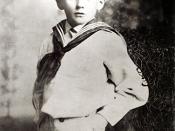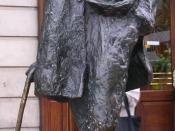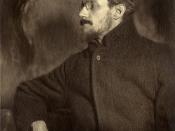In short stories, authors have a limited amount of space to convey attitude and reoccurring themes. In the short stories compiled into the novel The Dubliners, by James Joyce, the narration changes to fit into certain subtopics (such as childhood). Joyce's diction in "The Sisters" and "Counterparts" is correlating directly with the subtopics of childhood and mature life. Imagery throughout the stories points to the differences between adolescence and mature life. Joyce's deliberate choice in literary devices throughout the short stories of "The Sisters", "Eveline", and "Counterparts" truly contrasts the subtopics within them.
In the short story "The Sisters", the dialogue between characters and the narrator's thoughts correlates to the subtopic of childhood. In the conversation between Jack and Old Cotter, Joyce chooses to leave the protagonist "puzzled" (5) and trying to "extract meaning from [Old Cotter's] sentences" (5). Conversations in which adults feel that children should be left out of, they leave out words that would complete their thoughts.
Old Cotter does this when he talks to Jack while the protagonist is in the room. "I wouldn't say he was exactly ... but there was something queer..." (4). These intentionally left out words are filled in by other adults but leave children trying to "extract meaning from ... unfinished sentences" (5). While the protagonist used to find Old Cotter "to be rather interesting" (4), he "soon grew tired of him" (4). The "soon" nature implied by Joyce of which the boy grows tired of Old Cotter once again shows his youth. Joyce uses the repetition of the word "children" (5) to drill it into the reader's head that not only is the protagonist a child but is the actions and feelings of the protagonist are childlike also. The thoughts of the narrator when he is afraid of...


